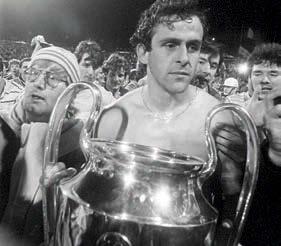
4 minute read
Michel Platini 1985
he will take a great deal of dislodging. Particularly as I believe he has already half decided to delay his retirement and stay a further two years with Juve when his contract expires at this season’s end.
Platini is gold, right now. A few years ago it was frequently suggested that for all his brilliance, his imagination and his goals, he succumbed to pressure on the biggest occasions.
He was in turns brilliant and infuriating in the 1978 World Cup finals in Argentina; in Spain he was handicapped by a leg injury; a year later he suffered a grey day as Juventus were surprisingly beaten 1-0 by Hamburg in the final of the Champions’ Cup in Athens.
That defeat, did we but know it at the time, was the turning point. From that moment Platini’s career has soared to new heights. Only Gunnar Nordahl in the far less restricted days of the early 1950s had previously taken the Italian scoring title in three successive seasons.
Such success was “merely” personal. On its own it would justify a high rating for Platini in the international circus. But his all-round inspiration at team level lifted Juventus to the Italian championship in 1984, the Cup Winners’ Cup that same No player had previously won the award twice, let alone twice in a row, since its
inception in 1982
year and then the Champions’ Cup last season in such desperate circumstances (Platini scored the decisive penalty).
This was not all. Platini’s football world transcends the club game just as his private life takes in a complex daily schedule including television and modelling assignments. Thus he scored two hat-tricks in leading France to the 1984 European Championship - under the most intense of pressure in front of his own French fans – and has now led them back to the World Cup finals.
In 1977 and again in 1981 France had come to their last qualifying match in the Parc des Princes needing a win to assure their place in the finals. Each time Platini scored a vital goal in that same net to the left of the official main stand.
An omen it appeared when France duly kicked off against Yugoslavia in that same direction. France had to win to be sure of qualifying, Yugoslavia had to win to stand any chance of qualifying. A draw would eliminate Yugoslavia and leave the French hoping East Germany did not claim a three-goal win against relaxing group winners Bulgaria that same evening.
The match was the event for the French nation that weekend. And the pressure was quickly relieved by none other than Platini himself. Belgian referee Alex Ponnet awarded the French two freekicks progressively closer to the edge of the Yugoslav penalty box inside the first two minutes. Platini elected to take the second himself and curled the ball past a flat-footed Ranko Stojic into the net.
Midway through the second half Platini struck again. This time Jose Toure nodded down an Alain Giresse free-kick on the right-hand touchline and Platini, striding at right angles to goal across the face of the penalty box, struck a grass-shearing left-foot shot inside Stojic’s left-hand post.
France were into the World Cup finals again; most decisively put there by Michel


Platini, the “Man for the Big Occasion”.
The match produced other talking points: some fine football from both teams, not least the gutsy and skilful Yugoslavs, stylishly led from midfield by Hajduk Split’s stormy petrel, Blaz Sliskovic; some typical bursts of invention from the four-man French midfield where the fast-progressing Luis Fernandez was dynamism personified; on the negative side the capacity 54,000 crowd saw further evidence of a crisis in attack, with Dominique Rocheteau slowed to passenger pace and Toure manifestly unhappy up front; also the late red cards for Ljubomir Radanovic (just) and Yvon Le Roux (harsh); and an appalling refereeing display by the once-reliable Ponnet.
But, at the end of the night, one image remained: that of Platini in triumph running to the crowd to celebrate. Later Platini and his entourage celebrated more selectively at La Coupole in Montparnasse, where once Scott Fitzgerald and Ernest Hemingway drank all-comers under the tables.
To pursue the literary allusions: after this success such a night must have been tender indeed before Platini’s thoughts turn to next year’s dangerous summer in Mexico.
Top 10 Players of 1985
Player Club
Country % of vote 1) Michel Platini Juventus France 20.6 2) Preben Elkjaer Verona Denmark 11.2 3) Diego Maradona Napoli Argentina 7 4) Peter Reid Everton England 6.7 5) Bernd Schuster Barcelona West Germany 5.9 6) Rudi Voller Werder Bremen West Germany 4.8 7) Neville Southall Everton Wales 3.9 8) Hans-Peter Briegel Verona West Germany 3.8 9) Karl-Heinz Rummenigge Internazionale West Germany 3.2 10) Andy Gray Everton/Aston Villa Scotland 2.9

Double winner…it was Platini’s second World Player award in a row
Other World Soccer Award winners 1985
Toffees hero…Peter Reid
TEAM OF THE YEAR: Ever ton










